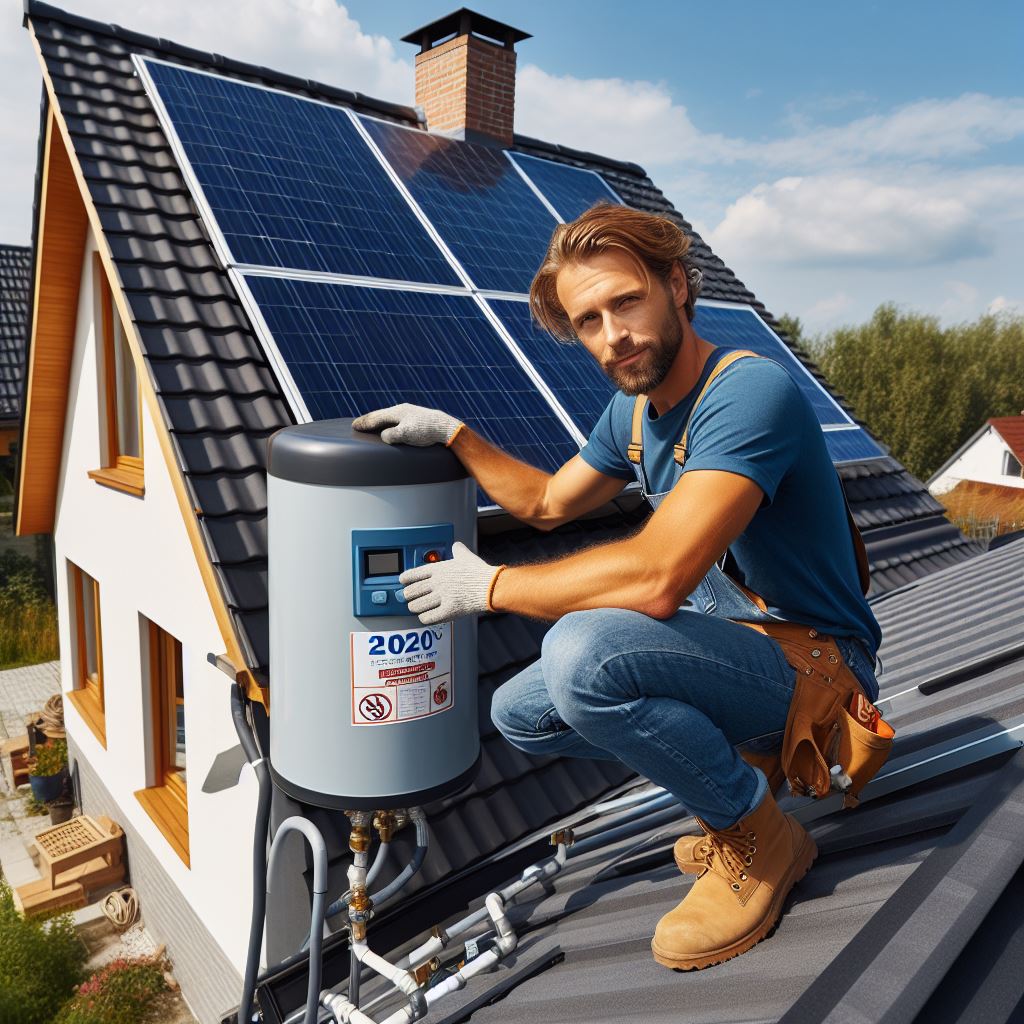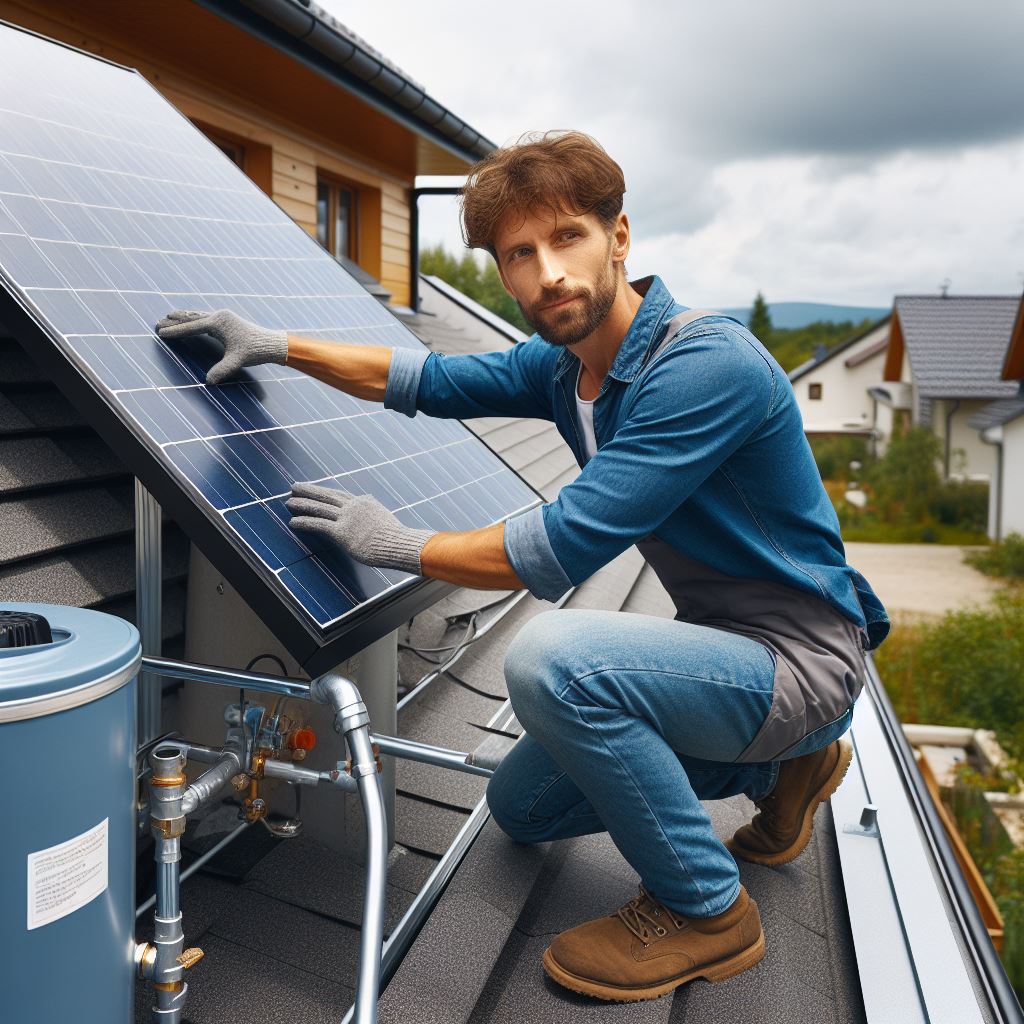When you’re considering upgrading your home’s hot water system, solar is a path worth exploring. It’s not just a buzzword in today’s eco-conscious world, it’s a practical, cost-effective solution that I’ve seen work wonders in numerous homes. Solar hot water systems harness the sun’s energy, providing hot water in a way that’s both efficient and environmentally friendly.

Why Go Solar for Water Heating?
- Cost-Effectiveness: Post-installation, the sun’s energy is free, leading to reduced utility bills. It’s like investing in future savings.
- Eco-Friendly Approach: By using renewable energy, you’re reducing your carbon footprint, making a positive impact on the environment.
- Future-Proof Investment: In an era of escalating energy costs, a solar hot water system locks in energy efficiency for years to come.
Understanding Solar Hot Water Systems
Solar hot water systems are a blend of simplicity and technology, using solar energy to heat water. It’s a concept as old as time, but with modern twists.
Types of Systems
- Active (Pumped) Systems: These systems use pumps to move water or a heat-transfer fluid. There are two varieties:
- Direct Circulation Systems: Suited for milder climates, these systems circulate household water through solar collectors.
- Indirect Circulation Systems: For freeze-prone areas, they use a non-freezing fluid to collect heat and transfer it to the water.
- Passive (Compact) Systems: Simpler and often more reliable due to fewer moving parts. They come in two types:
- Integral Collector-Storage Passive Systems: Work well in climates where freezing temperatures are rare.
- Thermosyphon Systems: Utilize the natural flow of warm water rising and cooler water falling, a bit more expensive but very efficient.
Key Components
- Solar Collectors: These are the workhorses, installed on the roof to capture sunlight. Flat-plate and evacuated-tube are the common types.
- Storage Tanks: Similar to conventional water tanks but adapted for solar input and output.
- Heat Transfer Fluids: In cold climates, these fluids are essential to prevent system damage from freezing or overheating.
- Controllers: These regulate the system, ensuring efficiency and safety.

Benefits of Solar Hot Water Systems
Save Your Hard-Earned Cash
- Energy Efficiency: The sun’s energy is free, leading to substantial savings over time.
- Government Incentives: Look out for rebates and incentives which can offset the initial investment cost.
Environmental Responsibility
- Reduced Carbon Footprint: Solar systems have minimal environmental impact, a significant step towards a greener home.
Dependability and Longevity
- Durability: Properly maintained, these systems are robust, often lasting over two decades.
- Consistent Hot Water Supply: They are designed to provide hot water reliably, even in less sunny conditions.
Installation and Maintenance
Embarking on the installation of a solar hot water system is a journey that requires some thoughtful planning and a bit of elbow grease. Having tackled numerous home renovations, I’ve come to appreciate the nuances of a well-executed installation.
Before You Start: What to Consider
- Climate: Your locale’s weather plays a pivotal role. Less sunny areas might necessitate a more efficient setup.
- Sun Exposure: A sun-drenched roof is ideal. Remember, shade from trees or nearby structures can impact your system’s effectiveness.
- Roof Condition: A sturdy roof is non-negotiable. You don’t want the additional weight of solar panels causing structural woes.
Installation: Step-by-Step
- Site Survey: Assess your roof’s suitability and sun-catching potential.
- System Selection: Opt for a system that aligns with your survey findings.
- Mounting the Collectors: Attach the collectors securely, angling them for maximum sun exposure.
- Tank Installation: Position the storage tank, considering system type and space availability.
- Piping and Insulation: Link the collectors to the tank, ensuring all pipes are well insulated.
- System Integration: Seamlessly integrate the system with your existing plumbing and electrical setups.
- Testing: Post-installation, thoroughly check for leaks and test the system’s functionality.

Maintenance for Peak Performance
- Collector Cleaning: Regularly clean your solar collectors for uninterrupted efficiency.
- Annual Inspection: Look out for leaks, damaged insulation, or unexpected shade on collectors.
- System Flush: Periodically flushing the system can prevent sediment build-up.
Troubleshooting Common Issues
- No Hot Water: Could be a result of overcast skies, system leaks, or electrical faults.
- Insufficient Water Temperature: Inadequate system size, poor solar exposure, or collector inefficiencies might be to blame.
- Leaks: Ensure all connections are secure and inspect for pipe damage.
Choosing the Right System for Your Home
Selecting the appropriate solar hot water system is akin to choosing the right foundation for a house – it’s fundamental to the project’s success.
Evaluating Different Models
- Housing Type Considerations: From apartments to detached homes, each building type has its unique requirements.
- Roof Dynamics: The configuration of your roof, whether flat or sloped, affects the installation method.
Size and Capacity
- Household Size Matters: Larger families typically require larger systems.
- Sunlight Availability: Ample sunlight allows for a smaller, more efficient setup.
- Water Usage Patterns: High consumption necessitates a system with greater capacity.
Cost Analysis
- Upfront Investment: Factor in installation costs and potential structural modifications.
- Long-Term Payoff: Evaluate the energy savings over the system’s lifespan.
Choosing an Installer
- Track Record: Seek a contractor with proven experience in solar installations.
- Credentials: Verify their licensing and insurance status.
- References: Request and follow up on past project references.
In my many years in the field, I’ve seen solar hot water systems provide immense value and satisfaction to homeowners. The key lies in choosing the right system, ensuring proper installation, and maintaining it regularly. Follow these guidelines, and you’re well on your way to harnessing the sun’s power efficiently and effectively.

DIY vs Professional Installation
In the realm of home improvement, the decision between DIY and professional installation is a common crossroads. With my experience in renovation, I’ve seen the value in understanding both paths when it comes to solar hot water systems.
DIY Installation: A Balanced View
- Cost Efficiency: Opting for DIY means saving on labor costs, which can be significant.
- Educational Value: There’s a wealth of learning in doing it yourself, from plumbing basics to solar technology.
- Personal Achievement: Completing such a project can be deeply satisfying, instilling a sense of pride and ownership.
Cons:
- Complexity and Time: These systems are not simple. They require a solid understanding of various systems, which can be time-consuming for a novice.
- Risk of Errors: Mistakes in installation can be costly, affecting both the system’s efficiency and your home’s safety.
- Safety Concerns: Roof work and electrical installations come with inherent risks.
When to Opt for a Professional
- Skill Level: If your skills in plumbing or electrical work are limited, a professional is advisable.
- Compliance with Regulations: Professionals stay abreast of local codes and permit requirements, ensuring compliance.
- Safety and Insurance: Professionals have the right tools and safety equipment, and their work is often insured.
- Warranty Preservation: Many warranties require professional installation.
FAQ Section
These systems capture solar energy using panels, which then heat the water in a storage tank. They typically include a backup system for less sunny days.
The savings depend on your current costs and usage, but reductions in water heating bills can range from 50-80%.
Yes, they are effective even in colder regions, particularly systems designed for such climates.
Properly maintained, they can last upwards of 20 years, making them a durable investment.
Many local and federal programs offer incentives such as rebates or tax credits for solar installations.
It’s based on factors like household size, local climate, and hot water usage. Roughly, 20 square feet of collector area per person is a good starting point.
Yes, most homes can accommodate a solar hot water system retrofit, provided there’s adequate space and sun exposure.
They’re relatively low maintenance. Annual inspections and periodic cleaning of the solar collectors are usually sufficient.
Active systems use mechanical pumps to circulate water, while passive systems rely on natural circulation and have no moving parts.
Definitely. They reduce dependence on fossil fuels and decrease greenhouse gas emissions, making them a sustainable choice.
